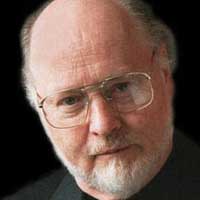Williams, John - Biography
Williams, John Biography
recording of the score for Star Wars Episode I: The Phantom Menace.
John Towner Williams (born in New York, February 8, 1932) is one of the most widely recognized composers of film scores. He is often credited with the revival of the grand symphonic film score, specifically with his richly thematic and highly popular 1977 score to George Lucas' 'Star Wars.' While skilled in a variety of 20th century compositional idioms, his most familiar style may be described as a form of Neoromanticism, informed by the large-scale orchestral music of the late 19th century and that of Williams' film-composing predecessors. The influence of Korngold and other Hollywood Golden Age composers is strong in much of Williams' most famous work. Though the heroic, brassy music of films such as Star Wars, Superman, and Raiders of the Lost Ark may be what Williams is best known for, his long list of works include many scores for sensitive dramas and more experimental concert works.
| Contents |
Credits
Among his composing credits are:
- Olympic Fanfare and Theme
- Jaws
- Star Wars movie series
- Close Encounters of the Third Kind
- Superman
- Indiana Jones movie series
- E.T. the Extra-Terrestrial
- Hook
- Schindler's List
- Jurassic Park movie series
- Saving Private Ryan
- Catch Me If You Can
- Harry Potter movie series
- The Terminal
He wrote the scores for several TV shows, including Gilligan's Island, Lost in Space and NBC Nightly News. Williams often works with Steven Spielberg and George Lucas and has been nominated for 43 Academy Awards, of which he has won five (for Star Wars, Fiddler on the Roof, Jaws, E.T. the Extra-Terrestrial and Schindler's List). He currently holds the record for the most Oscar nominations for a living person and has the third most Oscar nominations in history. Furthermore, he holds the record for the most Academy Award losses ever (37).
Early life
In 1948, John Williams and his family moved to Los Angeles, where he attended UCLA (the University of California in Los Angeles). He also studied composition privately with Mario Castelnuovo-Tedesco, who also taught another great film score composer, Jerry Goldsmith.
Williams returned to New York after service in the Air Force. There he went to the famous Juilliard School, one of the most well known music schools in America (other famous alumni include Philip Glass and Itzhak Perlman). There he had piano lessons with Rosina Lhevinne. In New York, he worked as a jazz pianist.
Film career
Williams later returned to Los Angeles, where he started working in the film studios. There he worked with some of the finest film score composers of that time: Franz Waxman, Bernard Herrmann and Alfred Newman. He began his career composing TV scores.
In the early 1970s, he scored some of the big-budget disaster films that were popular at the time. His scores for The Towering Inferno and The Poseidon Adventure, for example, are particularly impressive. In 1975, he got his big break. After meeting Steven Spielberg, he was commisioned to write the music for Jaws, Spielberg's upcoming film. The music is legendary for its dum-dum-dum-dum-dum-dum theme for the shark (perhaps the single most recognised theme in film music history), and earned Williams his second Academy Award (he had won his first for his 1971 adaptation of the music for the film version of Fiddler on the Roof). Williams' collaborations with Spielberg have been some of the most fruitful of his career, and they have worked on more than twenty films together. Williams has so far won five Academy Awards. Three have been for Spielberg films (Jaws in 1975, E.T. The Extra Terrestrial in 1982 and Schindler's List in 1993). Spielberg has on many occasions lavished praise on Williams, calling him the greatest film music composer of all time.
From 1980 to 1993, Williams was the principal conductor of the Boston Pops Orchestra. He still has close ties with the Pops and the Boston Symphony Orchestra (BSO), which have much overlap and both perform out of Boston's Symphony Hall. He conducts several concerts with the Boston Pops every year, particularly during their Holiday Pops season. He also frequently enlists the Tanglewood Festival Chorus, the official chorus of the BSO, to sing choral music in his movie scores (such as Saving Private Ryan).
Williams has written various concert works, including concerti for flute, violin, trumpet, cello, and tuba.
He is an accomplished pianist, as can be heard in various scores in which he provides solos, as well as a handful of classical recordings.
Apart from the five Oscars he has won, Williams has also been the recipient of at least two Emmys, seventeen Grammies, an induction into the American Classical Music Hall of Fame and the Hollywood Bowl Hall of Fame, and a 2004 Kennedy Center Honor.
External links
- http://www.johnwilliams.org
- http://www.bso.org
- http://www.jwfan.net
- http://musicby.jw-music.net/
- John Williams (http://www.imdb.com/name/nm0002354/) at the Internet Movie Database
- http://www.americanclassicalmusic.org
- http://www.hollywoodbowl.com/misc/halloffame.cfm/
This biography is published under the GNU Licence

